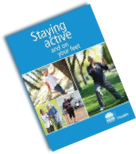Research shows that regular exercise improves mobility in people with Parkinson’s disease. In particular, it appears that balance exercises (including tai chi) and leg muscle strengthening exercises are important in reducing risk of falling, especially in the early stages of the disease. If you have experienced repeated falls or a fall resulting in injury or have blacked out when you fell it is recommended that your consult with your medical practitioner.
If you are in the early stages of the disease and are independently mobile at home and the community, you may wish to take advantage of some of the group exercise programs listed on this website. You may also like to consider tai-chi or dancing opportunities designed specifically for people with Parkinson’s disease.
If you would like further information you might find the Parkinson’s NSW website helpful. Information and online exercises are also available on the PD Warrior website.
If you have not exercised recently and/or you are more significantly affected, experiencing significant slowness of movement, stiffness or freezing, then consultation with a physiotherapist with experience in neurological rehabilitation is recommended. A physiotherapist will be able to prescribe and monitor an appropriate exercise program that targets your movement problems. If you have other medical conditions, such as heart disease, arthritis or diabetes, you should also consult your medical practitioner to ensure that moderate intensity exercise is appropriate for you.
You should feel safe and steady when you are engaging in exercise and should you have any concerns about your mobility or exercise, you should contact your medical practitioner or a physiotherapist.
Physiotherapists with experience in prescribing exercise programs for people with Parkinson’s disease can be accessed in the following ways:
- Get a referral from your local doctor for a physiotherapy rehabilitation outpatients department at one of your local public hospitals (check to ensure the department caters for people with neurological conditions).
- Contact the Australian Physiotherapy Association and click on the yellow Find a Physio button at the bottom, right side of the screen: enter your postcode and state; under treatment click on “neurology”, then click on search. Phone 02 8748 1555.
Reference:
Associate Professor Colleen Canning
Discipline of Physiotherapy
Faculty of Health Sciences
The University of Sydney

